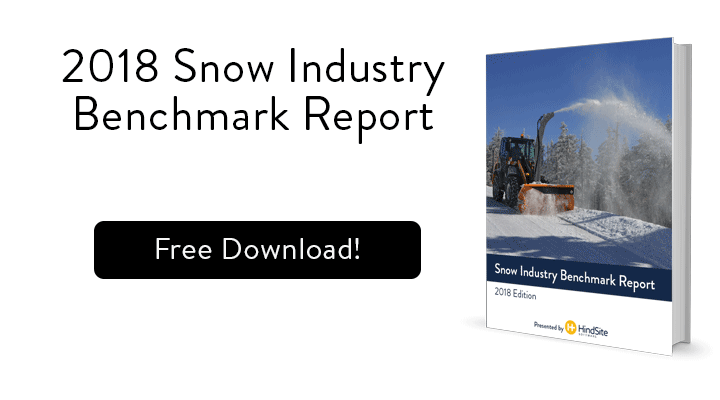
For Andrew Morse, the general manager of the Recurring Division of Belknap Landscape in New Hampshire and the person responsible for overseeing the 30-year-old business’ snow removal work, communication is the key to serving customers. “Communication is a big deal. A lot of our clients understand that stuff’s going to happen - equipment breakdowns, employee problems, the timing of the storm - our clients understand that things are going to happen, but as long as we keep them notified everyone’s happy. A big thing with snow is communication.”
Morse says one of the keys to their success is communication. And it all starts with the initial sales process. “We have account managers and they’re the ones that communicate with the clients non-stop from beginning to end. That’s one of our selling points when we bring on new clients. The fact that they have one person that they can call about their year-round needs is a big selling point.”
Like most snow removal veterans, Morse knows that a lot goes into a snow event. “Any snow event is a minimum three day project. Before the storm, we have all our group managers call all of their staff and put them on standby. We have people go around and warm up the equipment and make sure they have fuel. We make sure we have enough material in stock - like bulk salt. There’s all that prep work. The day of the storm we go through our daytime needs with staff and then we’ll do some additional cleanup at night. A storm may end at 3 o’clock, but we’ll always go back that night to clean up when the parking lot is wide open. On day 3 it’s pretty much going around and making sure the ice control has worked, making sure that everybody did what they were supposed to do. It’s a quality and safety control day. We then need to respond to our clients and let them know everything we did or alert them if there were any surprises.”
Morse has seen a lot in 27 years at Belknap, but what he loves about snow is simple. He likes taking care of employees and giving them year-round employment. “Knowing that our employees are being taken care of and getting hours in the winter and able to support their families is important to us. Two winters ago, people were throwing up the white flag saying we’ve had enough. We’ve had enough snow. This past year was the opposite. But it was nice to see that we had enough snow to have work for employees to do so they could have a career.”
But like most snow managers, he dislikes the uncertainty that comes with snow removal. “The uncertainty and the hours are tough. It’s late at night, it’s weekends. You can’t really plan too far ahead because you don’t know if it’s going to snow or not. From that point of view it’s very time consuming. It’s not like mowing grass where you know where you’re going to be every Tuesday.”
Like many snow contractors, Belknap relies primarily on word of mouth to add new customers. “A lot of our sales come from referrals or truck signage. Once we get a lead, we have a sales rep go and meet with the prospect to find their budget and their needs. There are some where we can’t meet their needs, they’re not in our territory. We have an open and honest conversation with them so as to not set an expectation we can’t meet. We have that dialogue right from the get-go. I can’t tell you how many times people have thanked me for just returning a phone call to tell them we can’t take them on.”
Once they’ve sold a client, Morse says their kickoff meeting is the key to successfully onboarding that new customer. “Once it’s sold and the account manager is assigned, the account manager is there at the signing of the agreement to transition from the sales person. They go over the agreement, they walk the property and they get everyone on the same page regarding what was sold, what’s expected, the work to be performed. Then the sales rep steps away and is no longer involved and the account manager is the person handling the contract.”
Morse has been in the snow industry for more than a quarter century, and one thing he’s noticed are changes in customer expectations. “Client expectations have gone up, especially in safety. Twenty years ago, you might go to a place and plow it once or twice in a storm. Now, especially commercial properties, they want black pavement because it’s a liability. They want the place safe throughout the whole storm. That has changed how we price, how we staff and how we schedule. It’s also allowed us to get into monitoring. Commercial properties want us to come to their property twice a day to check for snow drifts, freeze/thaw. They pay us to go to their location every day just to make sure it’s safe. It’s a win/win - obviously we get paid for that. But it also allows us to give more work to our staff.”
As for the future, Morse thinks documenting work is going to be increasingly important. “From a liability standpoint, we’re going to need to be documenting when we’re onsite and what we’re doing because there’s been a rise in slip and falls. One of the things we’ve done is add GPS to our trucks so we know where exactly a particular truck was. It’s almost going to become mandatory at some point, maybe by insurance companies.”
The 2015-16 snow season reinforced the value of diverse contracts. “It’s nice to have a blend of annual contracts and per storm contracts. If you stack your deck with all per-push contracts in a light winter like last winter, you’re going to lose. If you have all contracts with a set price and you have a busy winter like two years ago, you could lose your shirt because at some point you’re plowing for free.”
Like most snow businesses, labor is the biggest issue facing Belknap. “We rely a lot of the time on people looking for part-time work or high school kids. We’re moving toward trying to use more equipment and less labor. I saw the other day that Toro makes a lawn mower that you can put a blade on the front of. That could take the place of two other shovelers. We’re definitely looking at that option. In the future, I expect to have more equipment and less labor. Because unemployment is at 2%, we can’t find the labor. That limits our growth. If we can’t find the labor, we can’t do the work. We hardly have to market to get sales. But we have to have the labor to pull it off.”








